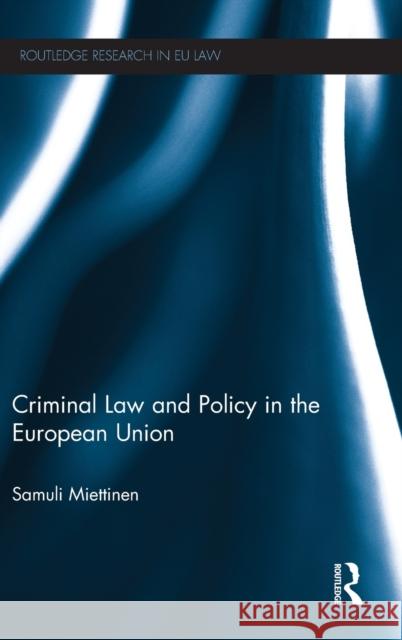Criminal Law and Policy in the European Union » książka
Criminal Law and Policy in the European Union
ISBN-13: 9780415474269 / Angielski / Twarda / 2012 / 304 str.
Criminal Law and Policy in the European Union
ISBN-13: 9780415474269 / Angielski / Twarda / 2012 / 304 str.
(netto: 743,28 VAT: 5%)
Najniższa cena z 30 dni: 705,23
ok. 16-18 dni roboczych.
Darmowa dostawa!
A literal construction of the EC and EU Treaties suggests that their framers intended to limit the positive competences of both the Community and the Union in the field of criminal law. However, the European Court of Justice has consistently applied tests of necessity and effectiveness to develop the Community's catalogue of legislative competences and the interpretation of Community law, culminating in decisions which accord to the Community a limited criminal competence where this is deemed necessary for the effectiveness of other policy aims. This book takes stock of the development of criminal law in the context of the European Community and the European Union, and examines whether this has led to a European criminal policy, and interrogates the legal effects that European-level initiatives in the field have on national criminal law and on suspects. The work reflects on the interaction between the law of the European Community and national criminal law since the signing of the Treaty of Rome and proceed to consider the prospects of criminal law enacted at the European level against this framework of historical development. The book will review the supremacy of Community law over conflicting national criminal law, the past legislative practice of harmonised 'administrative' penalties and their impact on national legal systems, the ramifications of the Greek Maize decision, the development of relevant Community principles of fundamental rights, and the 2005 decisions on implied criminal competence and sympathetic interpretation.
A literal construction of the EC and EU Treaties suggests that their framers intended to limit the positive competences of both the Community and the Union in the field of criminal law. However, the European Court of Justice has consistently applied tests of necessity and effectiveness to develop the Community’s catalogue of legislative competences and the interpretation of Community law, culminating in decisions which accord to the Community a limited criminal competence where this is deemed necessary for the effectiveness of other policy aims. This book takes stock of the development of criminal law in the context of the European Community and the European Union, and examines whether this has led to a European criminal policy, and interrogates the legal effects that European-level initiatives in the field have on national criminal law and on suspects.
The work reflects on the interaction between the law of the European Community and national criminal law since the signing of the Treaty of Rome and proceed to consider the prospects of criminal law enacted at the European level against this framework of historical development. The book will review the supremacy of Community law over conflicting national criminal law, the past legislative practice of harmonised ‘administrative’ penalties and their impact on national legal systems, the ramifications of the Greek Maize decision, the development of relevant Community principles of fundamental rights, and the 2005 decisions on implied criminal competence and sympathetic interpretation. In the light of these developments and the forthcoming October 2007 judgment of the Court of Justice in the Ship-Source Pollution case, the work will explore whether there are fields in which the Community might enact directly applicable criminal penalties in the form of EC regulations. It will also examine related doctrinal concerns considered by the Court of Justice in its earlier case law on the interface between EC law and national criminal law.











